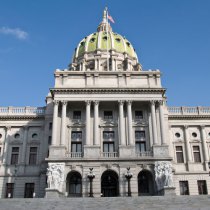Pa. Budget Passes General Assembly with Relative Ease
This year, we experienced a political unicorn in Harrisburg. Not only were the 2021-2022 state budget negotiations relatively painless, but also everything was voted on in an expedient fashion and the budget was wrapped well before the start of the new fiscal year on July 1. Adding to the overall ease of the process – and probably another political unicorn – was the state’s revenue surplus and unused funds received from the federal government for COVID relief.

 By Alex Fabian, PICPA government relations manager, and Peter Calcara, PICPA vice president – government relations
By Alex Fabian, PICPA government relations manager, and Peter Calcara, PICPA vice president – government relations
It does not happen often in Harrisburg, but this year we experienced a political unicorn. Not only was the 2021-2022 state budget process relatively painless with the majority of contentious items being worked out behind closed doors rather than in public, but the issues also were voted on in an expedient fashion and the budget was wrapped up five days before deadline (the start of the new fiscal year is July 1). The Pennsylvania Senate and the House of Representatives passed a $40.8 billion budget on June 25, and Gov. Tom Wolf signed it a few days later on June 30.
Adding to the overall ease of the process – and probably another political unicorn – was the state’s revenue surplus and unused funds received from the federal government for COVID relief. Lawmakers resisted the urge to spend the entirety of the excess funds and instead are depositing over $2.52 billion into the state’s Rainy-Day Fund and holding over $5 billion of American Rescue Plan resources in reserve to be used in future budgets.
 The budget passed the House on a 140-61 vote; the Senate approved it by a 43-7 vote. The state spending plan also requires approval of several other legislative components, namely the Fiscal Code (House Bill 1348), the Administrative Code (House Bill 336), the Tax Reform Code (House Bill 952), and the Public School Code (Senate Bill 381).
The budget passed the House on a 140-61 vote; the Senate approved it by a 43-7 vote. The state spending plan also requires approval of several other legislative components, namely the Fiscal Code (House Bill 1348), the Administrative Code (House Bill 336), the Tax Reform Code (House Bill 952), and the Public School Code (Senate Bill 381).
Supporters say the approved budget plan meets critical needs and offers a financial safety net for the future. Additionally, there was a fair amount of bipartisan support for the investments it makes in schools and the continuing economic relief from the COVID-19 pandemic.
Overall, the budget supports core government services, makes new investments in education, and prioritizes Pennsylvania’s most vulnerable citizens, including significant funding to Pennsylvania’s nursing homes and other long-term care facilities. The spending plan also ensures transportation infrastructure projects can continue.
Public education was a big winner. The agreement spends an additional $416 million over previous expenditures, including a $200 million increase to the fair funding formula and $100 million for Level Up, a new initiative providing more equitable funding to the 100-most-underfunded districts and the students they serve.
The budget raises the cap for the Educational Improvement Tax Credit (EITC) program from $185 million to $225 million, a 21.6% increase, with the entire increase going toward the scholarship organizations program that benefits private school students.
“Our economy has weathered the pandemic and now is roaring forward. We are a commonwealth on the comeback,” Wolf said in a statement. “This budget will help our state move forward and rebuild a strong, equitable economy that works for Pennsylvanians.”
Senate Majority Leader Kim Ward (R-Westmoreland) echoed the governor’s comments on the budget, stating that it “transitions Pennsylvanians out of crisis and positions us, the commonwealth, for success.”
While there were partisan disagreements over the decision to save most of the $7 billion in federal COVID-19 recovery aid, the spending plan was finalized with relatively little drama. A budget surplus is surely a welcomed change from a looming budget deficit that is typical of the commonwealth’s earmarking process.
The PICPA government relations team and the PICPA State Taxation Steering Committee is often asked to comment on various legislative proposals and provide technical expertise that only CPAs can provide. The PICPA participated in a briefing for the state legislature on combined reporting – a common theme in all of Wolf’s budgets. Additionally, we provided technical expertise on an entity-level tax proposal, legislative proposals pertaining to Keystone Opportunity Zone hopping and net operating loss carryback and carryforward for small businesses, among other issues put forward by the legislature and Department of Revenue during budget discussions.
With the budget passing, it is the unofficial start of summer in Harrisburg, prompting government relations professionals and lawmakers to relax and take a deep breath. But we’re not done quite yet! Join Peter Calcara, PICPA vice president – government relations, for a PICPA Legislative Update webinar on July 15 at 9:00 a.m. for a deep dive into the 2021-2022 state budget and related legislation.
Sign up for weekly professional and technical updates from PICPA's blogs, podcasts, and discussion board topics by completing this form.
PICPA Staff Contributors
Disclaimer
Statements of fact and opinion are the authors’ responsibility alone and do not imply an opinion on the part of PICPA officers or members. The information contained in herein does not constitute accounting, legal, or professional advice. For professional advice, please engage or consult a qualified professional.






